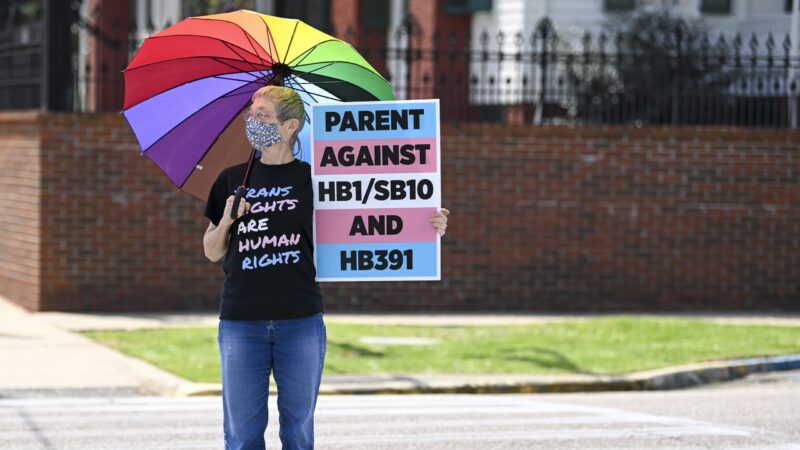Transgender medication law in Alabama blocked by judge
Jan Newton crosses the street to attend a rally held to draw attention to the anti-transgender legislation introduced in Alabama on March 30, 2021, at the Alabama State House in Montgomery, Alabama.
MONTGOMERY, Ala. (AP) — A federal judge on Friday blocked part of an Alabama law that made it a felony to prescribe gender-affirming puberty blockers and hormones to transgender minors.
U.S. District Judge Liles Burke issued a preliminary injunction to stop the state from enforcing the medication ban, which took effect May 8, while a court challenge goes forward. The judge left in place other parts of the law that banned gender-affirming surgeries for transgender minors, which doctors had testified are not done on minors in Alabama. He also left in place a provision that requires counselors and other school officials to tell parents if a minor discloses that they think they are transgender.
The Vulnerable Child Compassion and Protection Act made it a felony, punishable by up to 10 years in prison, to prescribe or administer gender-affirming medication to transgender minors to help affirm their new gender identity.
Burke ruled that Alabama had produced no credible evidence to show that transitioning medications are “experimental” while, “the uncontradicted record evidence is that at least twenty-two major medical associations in the United States endorse transitioning medications as well-established, evidence-based treatments for gender dysphoria in minors.”
“Enjoining the Act upholds and reaffirms the ‘enduring American tradition’ that parents—not the states or federal courts—play the primary role in nurturing and caring for their children,” Burke wrote in the opinion.
The legislation was part of a wave of bills in Republican-controlled states regarding transgender minors, but was the first to levy criminal penalties against the doctors who provide the medications. In Arkansas, a judge blocked a similar law before it took effect. The U.S. Department of Justice and four families with transgender children challenged the Alabama law as discriminatory, an unconstitutional violation of equal protection and free speech rights and an intrusion into family medical decisions.
“This is a huge relief for transgender children and their families,” Dr. Morissa Ladinsky, a pediatrician who founded a Birmingham medical team that treats children with gender dysphoria, said late Friday.
“The court’s decision recognizes that this is well established care that has been endorsed by 22 major medical associations. This decision will ensure transgender children in Alabama, and beyond, can continue to receive this evidence-based well-known life-saving care.”
Representatives for Alabama Gov. Kay Ivey and Attorney General Steve Marshall could not immediately be reached for comment late Friday night.
The state attorney general’s office argued that the use of the medications is unsettled science, and thus the state has a role in regulation to protect children. During a court hearing before Burke, state attorneys argued European countries take a more conservative approach to the medications. Alabama lawmakers, who approved the bill this spring, said decisions on the medications should wait until adulthood.
“I believe very strongly that if the Good Lord made you a boy, you are a boy, and if he made you a girl, you are a girl,” Ivey said when she signed the legislation last month.
The judge said Alabama’s evidence was not persuasive. He noted a psychologist who testified that most children grow out of gender dysphoria had never provided care to a transgender minor under the age of sixteen. The state’s other witness was a woman who testified that she regretted taking testosterone at age 19.
The American Academy of Pediatrics and the Pediatric Endocrine Society both endorse the treatments that clinics here and in other states are providing for transgender youth. More than 20 medical and mental health organizations urged Burke to block the law.
Senate committee details failures by Secret Service in preventing Trump shooting
The Senate Homeland Security Committee said the Secret Service's "lack of structured communication was likely the greatest contributor to the failures" at the Pennsylvania rally last summer.
Nigeria’s former President Muhammadu Buhari dies at 82
Nigeria's former president Muhammadu Buhari — who once ruled as a military dictator before returning decades later as an elected leader — has died at 82.
Los Angeles houses of worship plan for possible ICE Raids
Churches in Los Angeles put contingency plans in place after the Trump administration rescinds long-standing guidance advising immigration agents to avoid houses of worship.
‘Love Island USA’ might decenter whiteness — but the show still won’t face reality
The finale of Love Island USA airs Sunday night. Critic Aisha Harris says it's impossible to separate the season's racial and ethnic diversity from the show's mealy-mouthed handling of behind-the-scenes drama.
Folklife stars: Maya artist, Bolivian rappers, Dolly Parton’s guitar restorer
They all showed off their talents at this year's Smithsonian Folklife Festival. The theme: How youth keep cultural traditions alive.
Israeli strikes in Gaza kill at least 19, hospitals say, as ceasefire talks drag on
Israeli strikes in the Gaza Strip killed at least 19 people on Sunday, including six children at a water collection point, local health officials said.









